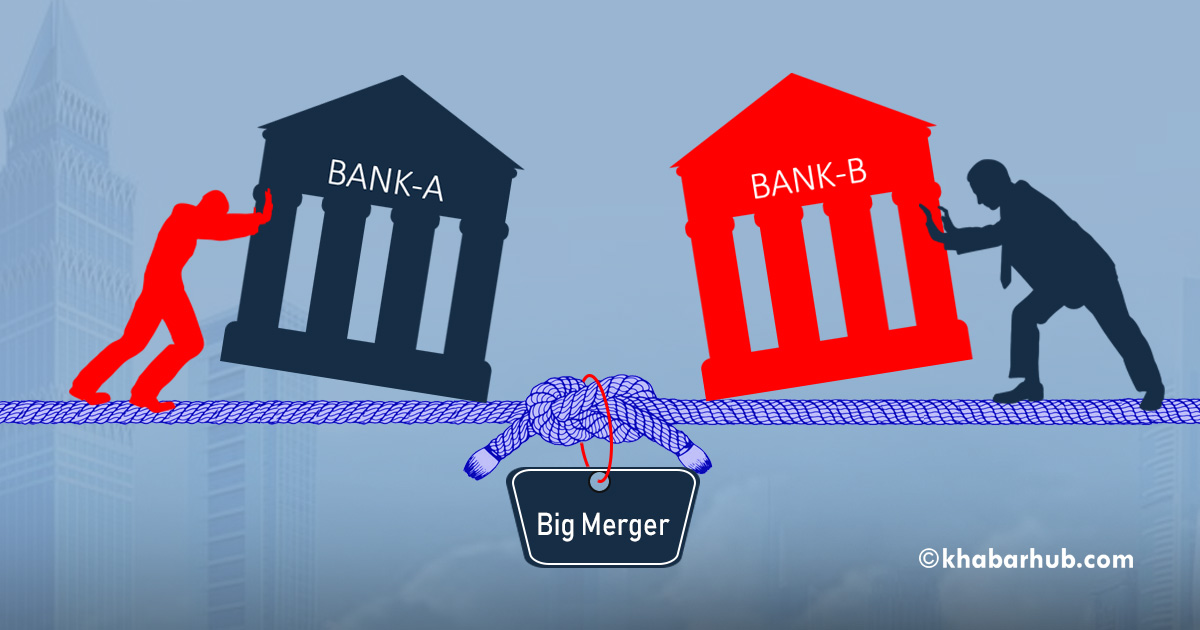0%

KATHMANDU: Nepal Rastra Bank (NRB) is all set to unveil monetary policy for the fiscal year 2019/20 on July 12. Currently, it is busy collecting suggestions from the stake holders from across the country on the upcoming policy.
There have been speculations that the provisions in the upcoming monetary policy are likely to force commercial banks to undergo a merger process. Earlier, Governor Dr Chiranjibi Nepal had held a meeting with bankers at a five-star hotel and directed them to furnish a list of those banks opting for merger within 15 days. Janata Bank and Global IME have agreed to undergo a merger process in line with the direction. Other seven banks have also submitted a Letter of Intent (LOI) for a merger. However, it is not still certain whether the much-talked big merger plan will really happen.
Is a big merger necessary?
In the fiscal year 2015/16, NRB had initiated a merger and acquisition process citing that they lacked sufficient capital base as a mandatory reserve.
The NRB, in the monetary policy, introduced an obligatory provision making it mandatory for a commercial bank to have at least Rs 8 million as paid up capital. This monetary policy had courted controversies then.
In line with the NRB’s policies, commercial banks underwent the merger and issued rights shares, as a result of which almost all the commercial banks managed to have paid up capital fixed by the central bank.
The big merger had been proposed citing that the NRB could not monitor all the banks in their daily financial transactions. However, this strategy cannot bring down the number of commercial banks doing business at present in Nepal. The government has incorporated this provision for the fiscal year 2019/20.
Is the big merger really feasible?
The merger among commercial banks is easier said than done. The failure of merger between Janata Bank and Machhapuchchhre bank is an example which proves how complex is the process and challenges underlying it.
Similarly, the merger between Hamro Development Bank and Jyoti Development Bank also could not happen after the special general meeting of the former did not approve the merger proposal.
It is necessary to forge agreement on staff integration and agreement on swap ratio to the Board of Directors prior to undergoing a merger.
Experts do not feel confident of the immediate merger among the banks since the agreement is unlikely unless the stakeholders concerned come to terms with swap ratio.
Experts warn of a possible monopoly
Experts are of the opinion that the NRB should be well aware of the possible impacts (that) the reduction in the number of commercial banks would have on the people in general to industrialists in particular. Currently, there are 28 commercial banks operating in the country.
Economist Dr Chandramani Adhikari said, “Homework and a great deal of study are necessary prior to going for a big merger. But, it should not foster concentrating power as an adverse influence on the banking system and gag healthy competition in the financial sector as a consequence.”
“When the number of banks goes down, there will be less competition among banks and those who are willing to invest in the banking sector and gross numbers of loans taken from commercial banks will also go down,” said former governor Dr Tikal Rawal, echoing Adhikari’s views.
Rawal went on to say, “Earlier banks’ interest rate had reached 13 to 14 percent. But in the current fiscal year, it is available at only 8 percent. Industrialists, businessmen and farmers are getting loans at subsidized rate due to competition among the banks.
Banks may exercise monopoly on banking activities as there will be a few banks going for a merger.
The big merger may have positive sides, too. It will resolve the existing liquidity problem in the country and can manage to attract a huge amount of investment for a development project and other business-related plans, say experts.